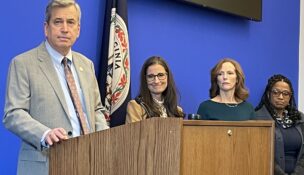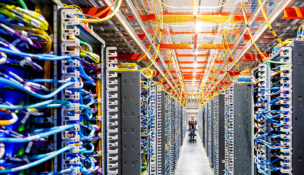Rocket Lab expands Virginia’s role in commercial space launch, exploration

Photo by Jenny Allen with Capital News Service

Photo by Jenny Allen with Capital News Service
Rocket Lab expands Virginia’s role in commercial space launch, exploration
Summary
- Rocket Lab opens Launch Pad 0-D at Wallops Island for Neutron rocket
- Gov. Glenn Youngkin calls the project a major milestone for Virginia
- New pad supports aerospace development and economic growth in the region
- Neutron rocket aims for first flight this year, with potential missions to Mars
RICHMOND, Va. – Virginia celebrated the opening of its new launch pad last month at Wallops Island, which marks the state’s role in the aerospace industry. Gov. Glenn Youngkin attended the ceremony to cut the ribbon and called the opening an “engineering achievement” and “significant milestone.”
Rocket Lab Launch Complex 3 is located at a new launchpad created for the reusable Neutron rocket at the Mid-Atlantic Regional Spaceport, a commercial space launch facility that operates on NASA‘s Wallops Island.
The new launchpad supports demand for launch-related needs and will fuel aerospace development in Virginia, according to retired Maj. Gen. Ted Mercer, the CEO and executive director of the Spaceport.
“The opening of Launch Pad 0-D is a bold step forward for Virginia’s growing role in our nation’s commercial space launch industry,” Mercer stated in an email. “It provides the infrastructure to support more diverse and complex missions.”
The company is excited to meet the growing demand for an increased workforce, according to Rocket Lab’s senior manager of government operations Grace Casey.
The locality and connection to Virginia has the potential to drive economic development for both Rocket Lab and the region, according to Casey.
LaunchPad 0-D
Rocket Lab supplies launch services, spacecraft, satellite and orbit components, according to the company. The company enables more than 1,700 missions globally and supports the commercial, civil and defense markets.
The company began in New Zealand and moved to the U.S. in 2013 with a mission to make space more accessible for people on Earth, according to Casey.
“We’re able to reach a lot of the different orbits that we need to from Wallops, as well that we might not be able to get from New Zealand and other places,” Casey said.
The geographical benefits and isolation of Wallops made it the ideal location for this particular rocket, Casey said.
Rocket Labs Fully Reusable Rocket
Rocket Labs Electron is the second most flown U.S. rocket and the third most flown rocket in the world, according to Casey.
The reusable launch vehicle Neutron will support payload capacities up to 33,000 pounds, according to a press release by the governor’s office. Neutron plans to make its first flight by the end of the year and will launch low-orbit satellites and potentially reach farther orbits like Mars or Venus.
The launchpad has a black, 285-foot-tall water tower that holds approximately 200,000 gallons of water and can be emptied in less than one minute, according to the governor’s office.
Due to the large size of the Neutron rocket, more water is needed to provide safety and manage effects during a launch, according to Casey.
Rocket Lab is working with NASA on a project called “The Mars Telecommunications Orbiter,” according to Casey. This project’s mission is to take a large spacecraft to Mars to relay critical communications to Earth in order to improve future science and exploration missions.
Space Exploration Impact
Satellites are essential to obtain data that cannot always be collected on the ground, according to Chris Gough, executive director of Virginia Commonwealth University’s River Rice Center. The Center hosted research teams in collaboration with a NASA training program.
“I think space exploration, as well as any exploration, is part of our DNA, it’s inherent to who we are and what we do as humans,” Gough said.
The high volume impact of the Neutron rocket can be damaging to equipment but also to humans and living organisms, according to Joe Franzen, a mechanical and nuclear engineering student at VCU. He believes the water tower is a great safety addition to the facility as it decreases ground impact, creates noise reduction and reduces exhaust energy.
Franzen highlights the significant usage of solar panels for renewable energy and how space exploration has the ability to expand its benefits and collect data.
“I think the research that’s done in space, as well as the research done to get us into space, can be really beneficial to us down on Earth,” Franzen said.
Space exploration has led to beneficial research studies and results, and should continue to be pursued, Frazen said.
“Humans for a long time have looked up at the stars with wonder,” Franzen said. “We should definitely explore it.”
Capital News Service is a program of Virginia Commonwealth University’s Robertson School of Communication. Students in the program provide state government coverage for a variety of media outlets in Virginia.
S


















